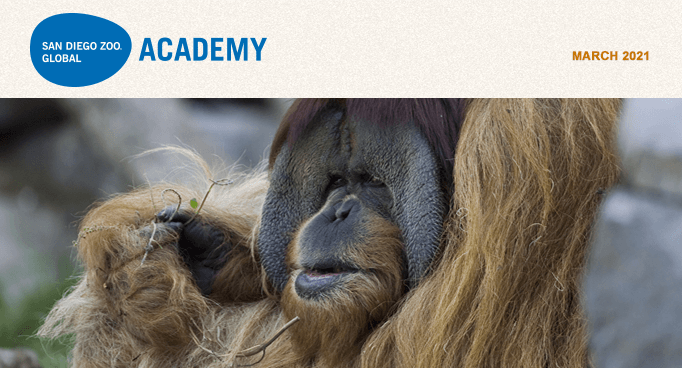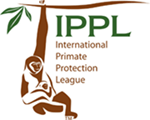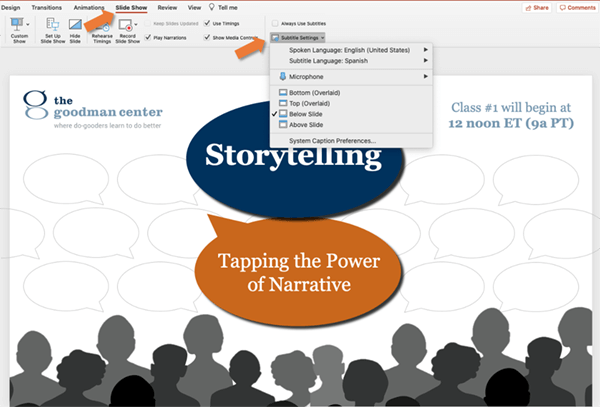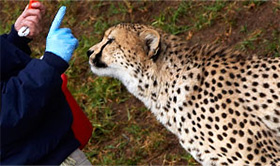 |
Volunteer Requirements Made Easy
By Tammy Rach, Senior Volunteer Manager, San Diego Zoo Wildlife Alliance
Volunteers provide incredibly valuable services to our organizations when we are able to put their passion for wildlife to work, building capacity by utilizing their time, talents, and expertise toward mission fulfillment. In this past year, filled with challenges requiring incredible flexibility and pivoting on a dime, many organizations have loosened their annual requirements for volunteers.
At San Diego Zoo Wildlife Alliance, we utilized this opportunity to engage our volunteers in different ways, sharing a multitude of opportunities for them to engage in from home. Most of these opportunities were online, through citizen science, Zoom meetings and socials, and continuing education on the Academy website. Being at home more than usual, volunteers had more time to get comfortable with the Volunteer Connection site, and we provided a list of suggested training options to keep them knowledgeable and engaged during temporary closures of the Zoo and Safari Park. It also gave us time to prepare for their return and help them meet our modified annual requirements, which include minimum hours for the year, completion of three training pieces, and completion of annual renewal documents. By completing these requirements, they earn an annual renewal sticker on their ID card, which allows them to visit both parks free year round, as well as getting retail discounts. It's quite a perk, which makes completing these requirements worthwhile.
This year, we utilized the "Assign" courses button for those who had not completed the required training, which made it much simpler for the volunteers. Instead of searching for the required courses as in the past, they received an e-mail and clicked on the link to complete their requirements.
We also utilized the "Learning Path" feature for COVID-19 training, so everyone was again sent a link to the first COVID-19 training document we required, and once complete, the second document was unlocked for them to finish. The phenomenal thing about utilizing these tools is that we could run reports using the "Reporting" feature in the Admin Tools tab. It easily pulls up information on who completed what, and when, using whatever parameters you set for your report. You can also visit an individual's files using the "Site Members" tab, then the search bar; and once you click on the volunteer, you can click on "View Transcript" to see details.
When we reopened our parks in late January, volunteers were eager to get their renewal stickers ASAP. By maximizing the use of our Volunteer Connection site, the process was smoother than ever. Volunteers now frequently comment on how wonderful it was for them to have so many opportunities to learn during our closures via the course modules and various training pieces, and they were grateful to have those resources available to stay connected to the wildlife they love so dearly. Many were astounded at what was available in the course catalog, and have made lists to continue their learning moving forward. And, with volunteers getting more familiar with the site, future assignments will be much easier for them to navigate. We were all pleasantly surprised at the skills we built, as well. The time you take to explore, investigate, and utilize features new to you is definitely time well spent!
For more information about this article, please contact Tammy Rach at trach@sdzwa.org.
If you are interested in offering your volunteers a dedicated Academy site, please contact Linda Duca at lduca@cypherworx.com.
|
Academy News
 San Diego Zoo Global Academy Puts the International Primate Protection League in the Spotlight San Diego Zoo Global Academy Puts the International Primate Protection League in the Spotlight
The International Primate Protection League is part of the Academy's collaborative learning environment!
Visit the International Primate Protection League's website.
Academy Holds Safe Capture Livestream Events

The Academy held a Safe Capture livestream event February 24–25, for 40 New York State Department of Environmental Conservation (DEC) employees.
From Kevin Hynes, New York State DEC Wildlife Biologist: "During the COVID-19 pandemic, the remote San Diego Zoo Global Academy Safe Capture chemical immobilization training program helped DEC wildlife staff remain current in their certifications, and certified new staffers working remotely. The training was easy to access, and DEC staff benefited from interacting with the instructor. DEC staff also enjoyed Dr. Mark Drew's delivery, passion, and personal anecdotes, and lessons learned from the field. While online training doesn't allow for hands-on demonstrations with dart-loading techniques and projectors, video and live demonstrations covered these materials—and altogether, the online training program provided an excellent overview on proper safety protocols for DEC wildlife staff."

The Academy also held a Safe Capture livestream event February 27–28.
This event, hosted by the University of Georgia College of Veterinary Medicine, drew online participants from all over the US, including veterinarians, wildlife biologists, students, and other wildlife management specialists. For DVMs who qualified, 16 hours of continuing education credits were offered through the UGA Office of Continuing Education.
Upcoming Safe Capture Livestream Events
The Academy's Safe Capture Training will be holding two-day livestreamed events on the following dates:

March 27–28, 2021
This event is being hosted by the University of Nebraska-Lincoln College of Natural Resources, however, you do not need to be a UNL student in order to participate. This training event has been approved for 16 hours of continuing education credit in jurisdictions that recognize AAVSB RACE approval.

April 13–14, 2021
This event is hosted by San Diego Zoo Global Academy, and is open to all participants. This training event has been approved for 16 hours of continuing education credit in jurisdictions that recognize AAVSB RACE approval.
For more information, or to register for these events, please visit our Safe Capture website at https://www.sdzglobalacademy.org/safecapture.
 Administrator's Users Group Webinar Administrator's Users Group Webinar
Please join us for the Administrator's Users Group Webinar, hosted by Academy partner CypherWorx. The next webinar is Friday, March 19, at 11 a.m. Pacific Daylight Time (PDT).
Register here
After registering, you will receive a confirmation email containing information about joining the webinar. |
Academy Contributors
 Why Most Videoconferences Aren't as Inclusive as They Could Be Why Most Videoconferences Aren't as Inclusive as They Could Be
By Andy Goodman, Director, The Goodman Center
Creating an inclusive atmosphere in which everyone present feels not only welcomed but valued can be challenging under the best circumstances. Remove the opportunities that come naturally when meeting in person—one-on-one chats, reading body language, sensing a group's energy level—and it can feel almost impossible. In our report, Unmuted: What Works, What Doesn't, and How We Can All Do Better When Working Together Online, which looks at the challenges videoconferencing presents, we heard this lament frequently from meeting leaders and facilitators.
Consequently, you might expect that those responsible for conducting videoconferences would use every tool and technique available to enhance inclusivity, and our research confirmed that they are—to some degree. But when it comes to using the tools specifically designed to include participants who may have difficulty seeing what's being shown, hearing what's being said, or fully understanding the language being spoken, most videoconferences miss the mark by a wide margin. Consider the responses below to a question in our survey about efforts to enhance accessibility:

When only 12 percent of respondents reported that they observed webinar or webcast leaders "frequently" or "always" taking steps to create greater accessibility—and that's the highest score across all categories of online convenings—clearly we are not prioritizing these activities. And what's even more disappointing is that the most popular videoconferencing platforms all have a variety of accessibility tools readily available.
During the last week of October 2020, we visited five videoconferencing platforms our survey respondents reported using most frequently to learn exactly which tools they provided. The built-in choices are abundant and include tools such as closed captioning, recordings with transcripts, high-contrast mode, screen readers and magnifiers, and more. (Please note that the options available to your organization may vary with your level of service.) If you haven't done so already, take the time to learn your options: here are links to the pages specifically dedicated to accessibility tools for Zoom, Webex, Microsoft Teams, GoToMeeting, and Google Meet.
Your efforts at enhancing accessibility don't have to end there. PowerPoint can increase accessibility when slides are part of your convening. Thanks to recent improvements by Microsoft, you can now set up your PowerPoint presentations to provide real-time subtitles for the speaker's narration, in either the speaker's language or translated into any of 70 other languages. (And if you have access to PowerPoint Live Presentation, each audience member can have the narration translated into the language of their choice.)

When setting up a Slide Show, select "Subtitle Settings" to find a choice of 70 languages, into which your narration can be translated and displayed on screen.
Two other resources to consider: US government agencies are required by Section 508 of the Rehabilitation Act to ensure that communication materials such as PowerPoint slides are fully accessible to people with disabilities. Guidelines on text, object and color formatting, and other design aspects can be found at section508.gov. And even if you don't work for the government, these are useful standards for evaluating the accessibility of your slides.
Finally, WebAIM (an acronym for "Web Accessibility in Mind") is a site maintained by the Center for Persons with Disabilities at Utah State University. It offers training, consulting, evaluation, and certification for organizations interested in enhancing the accessibility of all their web-based convenings and programs.
Visit The Goodman Center here. |

Interested in Joining the Academy?
Individual, Group, and Institution rates are available. Please contact Linda Duca at
lduca@cypherworx.com |

|